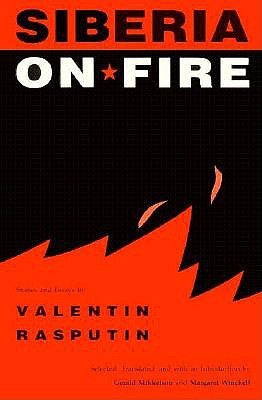If blood and soil are the stuff of nationalism, what does a Russian patriot do when the soil goes bad? He becomes an environmentalist—at least, this was the response of Valentin Rasputin (no relation to Gregory Rasputin who haunted the ill-fated reign of Tsar Nicholas II). But the Siberian-born Rasputin is more than another policy advocate: David Shipler, the New York Times correspondent and author of Russia: Broken Idols, Solemn Dreams (1983), has written that Rasputin is “widely considered the most talented writer in the country.” That designation is not insignificant in a culture with such a rich literary tradition, yet Rasputin is more, too, than a skilled wordsmith.
Perhaps “mystic” is the best word for him. “Neither the sky beyond the circle of fire nor anything to either side was visible, and the rain made a continuous noise. Sometimes it fell silent for a bit and sometimes it came down hard, and then the fire would hiss even more, resisting the water, shooting the small coals upward in annoyance and murmuring warnings from time to time with angry puffs.” This vivid imagery is found in the short story “Live and Love,” about a boy’s nights during a berry-picking outing on the taiga near Lake Baikal in Siberia. The fiction and nonfiction pieces in Siberia on Fire all convey Rasputin’s almost animistic feelings for nature.
In “What Shall I Tell the Crow” Rasputin describes the creative feelings of a writer who draws sustenance from forest life in the autumn: “Next to me three birch trees were sadly tossing down their leaves just like fortune tellers as they played some game. The air was absolutely still . . . ” Gerald Mikkelson and Margaret Winchell, who have turned Rasputin’s Siberianized Russian into sharp, uncluttered English, traveled continuously by car with him when he visited the Midwest in 1985; they describe his religious beliefs as a blend of Orthodox Christianity and Siberian shamanism. Rasputin, who plays down a formal commitment to Russian Orthodoxy, has said his philosophy is better characterized as that of old women who live in the small villages. However that may be, his concern with the purity of water in Lake Baikal, or the destructive deforestation taking place in Siberia, has less to do with politics and more to do with man’s essential relation to nature.
Another important motif in the works of Rasputin is the idea of Siberia as preserver of Russian culture. In the nonfictional “How Did They End Up In Irkutsk?” and in “Baikal,” Rasputin writes of how the Old Believers of the 17th century split with the Westernizers and headed from Moscow to the northern forests, and thence to Siberia. He also points to masterpieces now in the Irkutsk Art Museum that came to reside there when White sympathizers carried them East during the Civil War of 1918-1921. Confronted with a ferociously harsh climate and primitive native cultures, Russian pioneers in Siberia over the last four centuries have held to their culture to survive; and their descendants will undoubtedly draw from these same roots as they free themselves from brutally imposed Soviet communism.
“The Fire” dominates the other stories and essays. Published in 1985, it is an apocalyptic vision of the destruction of the Soviet Union, foretold in the metaphor of an unquenchable fire that breaks out in the food and supply warehouse of a small lumber town. The denizens of this manufactured community have no roots, some having lived formerly in old villages now submerged by the construction of a hydroelectric dam, others having been shipped in from other parts of the Soviet Union. The novella’s protagonist, Ivan Petrovich, was a young soldier in the Great Patriotic War. In his grueling effort along with other townsmen to put out the fire, Ivan reveals his despair over the loss of the old ways: “the general unwritten law, the very earth under their feet, had changed into a vestige of the past, into some kind of abnormality and almost into treason.” Looting, drunkenness, and violence break out despite the efforts of those who still try to hold onto remnants of the old ways of pulling together to help the village.
The genius of Rasputin and others who have come to be known as the derevenshiki (village writers) is to write of events in small towns, rather than discuss matters of political ideology or of grand historical sweep. The censors could not object to a realism that seemed to pose no ideological threat. Yet there is little doubt that Rasputin, especially in Live and Remember (1974) and Farewell to Matyora (1976), offers a stunning rebuff to Lenin and his heirs who raped the land in the name of progress.
Walter Laqueur (in his book The Long Road to Freedom and in the New Republic, February 5, 1990), Bill Keller (in the New York Times Magazine, January 28, 1990), and others have attempted to link Rasputin with anti- Semitism. Gerald Mikkelson and Margaret Winchell, who are perhaps the leading authorities in America on Rasputin’s beliefs, are appalled and outraged by these accusations. There is nothing in Rasputin’s literary works that deals with the subject of-the Jews, and it would seem that this terrible charge is ill-founded. However that may be, Mikhail Gorbachev surprised many observers by announcing last March that Rasputin would join his presidential cabinet as its then only non-Communist member. Many observers in the Soviet Union believe the position was given to Rasputin in order for Gorbachev to gain support from environmentalists, with whom Rasputin has undisputed credibility.
[Siberia on Fire: Stories and Essays, by Valentin Rasputin, Translated by Gerald Mikkelson and Margaret Winchell (DeKalb: Northern Illinois University Press) 252 pp., $30.00 (cloth), $12.50 (paper)]

Leave a Reply